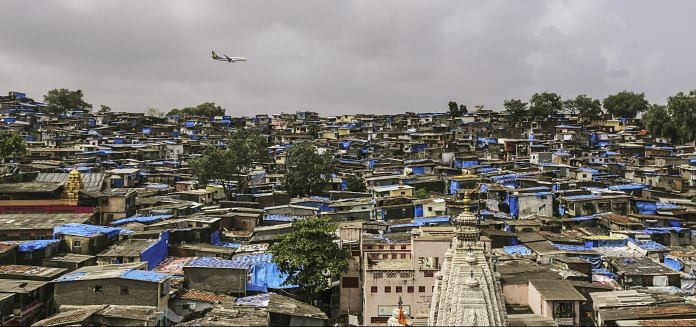New Delhi: A “new class of poor” is rapidly emerging due to the nationwide lockdown that was imposed on 25 March to contain the spread of Covid-19, a government body survey in slum households in 12 cities has found.
This new class has fallen below the poverty line due to job losses after the lockdown, the survey said. It found that 95.3 per cent of “new poor” households reported that their principal source of income has been affected.
The lockdown also affected the principal source of income of 95.8 per cent of Below Poverty Line (BPL) households living in slums in 12 cities, the survey said.
Besides, self-employed and casual labourers have been most badly hit. While 98.9 per cent of self-employed households reported an impact on their main source of income, the income of 97.6 per cent casual wage labour households has been affected.
The National Institute of Urban Affairs (NIUA), an autonomous body under the Ministry of Housing and Urban Affairs, partnered Chennai-based NGO World Vision to study the impact of Covid-19 on the lives and livelihood of slum dwellers in Anantnag, Bengaluru, Chennai, Delhi, Guwahati, Hyderabad, Indore, Jaipur, Kancheepuram, Kolkata, Mumbai and Srinagar.
The study, based on telephonic interview of respondents, was conducted in 1,157 random households between 24 April and 7 May.
Also read: How many jobs have we lost during lockdown? PMO seeks answers from ministries
Loss of employment at 85.3%
According to the government survey, 85.3 per cent of the total households surveyed reported a loss of employment.
While 91.4 per cent of the BPL households reported job losses, among the new poor or the moderately poor, the figure stood at 86.2 per cent. Among the non-poor households, 75.3 per cent reported loss of employment.
In the 12 cities, smaller ones like Anantnag, Jaipur, Kancheepuram and Srinagar saw a high share of households reporting loss of employment. Bigger cities like Delhi and Mumbai had a lower share of job losses even as salaries were pending, the study found.
It also said a fall in family income was the main reason behind increased domestic violence in many slum households — about 40 per cent reported increased domestic violence since lockdown.
The findings were presented at an online seminar hosted by NIUA, Centre for Sustainable, Healthy & Learning Cities & Neighbourhoods and UN-HABITAT last week.
Also read: Modi govt will soon publish a magazine in 13 languages to highlight its achievements
‘Address concerns of the poor immediately’
Speaking to ThePrint, the study’s lead author and NIUA professor Debolina Kundu said the new class of poor is emerging very rapidly.
“Concerns of this vulnerable class need to be addressed immediately along with the already existing poor whose condition has worsened over the past few months. Both food and cash support is necessary. Real time tracking of health and livelihood conditions of the poor is necessary,” she said.
“In the long run, there should be focus on improving the living environment of the poor to stall any such pandemic,” she said.
Kundu said measures like ‘One Nation One Ration Card’ are a welcome initiative, which will ensure portability of entitlements.
“However, a strong database needs to be generated on a real time basis so that every poor person has a card to access PDS (Public Distribution System). Also, health expenditure needs to increase and local governments should improve their capacities to deliver health services to the city dwellers, a function which was devolved under the 74th Amendment Act (1992), but has remained a forgotten agenda,” she added.
Also read: If Modi govt had followed this 2018 SC order, migrants wouldn’t have had to flee the cities
Other findings — how households managed to make ends meet
According to the study, 29.6 per cent households borrowed from neighbours and relatives to make ends meet during the lockdown, while 27.3 per cent households spent from their meagre savings even as most of them exhausted their savings soon. Another 19.2 per cent households depended on help from others.
Among the non-poor, 34.4 per cent households managed with their own savings. The study found that slum households in big cities like Delhi, Bengaluru, and Chennai are more dependent on neighbours and relatives while those in cities like Jaipur rely on borrowings from money lenders or local shops.
Households in Kancheepuram and Srinagar are heavily dependent on external aids, according to the study.
The extra ration announced by the government as part of the PM Garib Kalyan Yojana came in handy for the poor with 63 per cent of the slum households receiving them through PDS. Only 40.1 per cent households reported receiving cash transfers through various state governments and other schemes.
While 51 per cent of the surveyed households supported lockdown, a majority of them said they will die of hunger if it is not withdrawn soon. Only 22.7 per cent households in the BPL category said the lockdown was not needed.
It also found that migrant households have more difficulty in maintaining social distancing with 3.2 persons living in one room on an average. The study defined a migrant household as one where the household head is a migrant.
Contrary to popular perception, only a limited number of households — 8.6 per cent — do not have access to latrine, the survey found. Over 58 per cent households have access to exclusive latrine while 32.6 per cent households are dependent on shared latrine facilities.
Similarly, 66.2 per cent households have exclusive access to bathrooms. Only 4.5 per cent households did not have access to bathrooms.
Also read: States are going ahead with labour reforms, even if Modi govt is finding it hard to do so



